For nearly twenty years, I witnessed the Saudi religious police, (CPVPV) in action. These teams of steely-faced moral guardians would present themselves in Malls, shops, and busy public places to ensure that people were behaving well, especially women and to see that shops were closed for the five daily prayers.
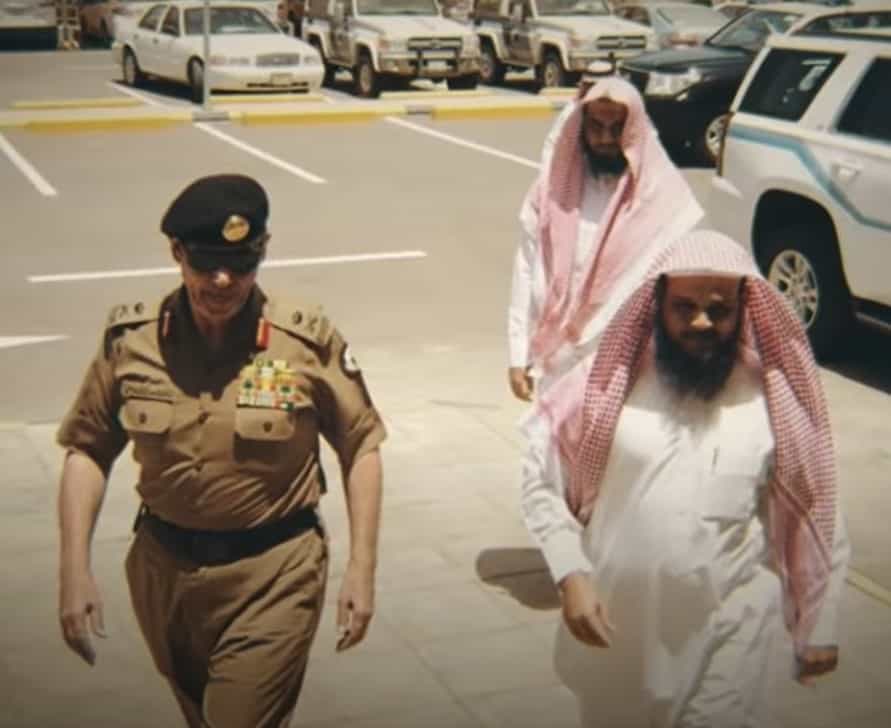
Everyone felt jittery when the Mutawa came around. Women avoided men and made sure to cover themselves well. Storekeepers were very anxious to turn lights off, get their customers out, and lock all the doors before the call to prayer (Adhaan) was raised.
If they failed to do so, the consequences were dire.
Then, one day in 2016, the religious police suddenly stopped appearing. Realizing this, everyone breathed a sigh of relief, and thereafter life continued pretty much as normal.
I always wondered what had happened to the Saudi religious police. Other than the black-uniformed police, are they still playing a role today in promoting good behavior and preventing immorality on the Saudi streets?
So, what happened to the Mutawa or Saudi religious police or (CPVPV)? In 2016, the Saudi Council of Ministers sharply curtailed the CPVPV powers following years of abuse and cases of accidental and unnecessary deaths in custody. They still function today but are not allowed to randomly detain people, take IDs, arrest, or interrogate. However, they can report crimes or instances of ‘immoral’ behavior but are compelled to deal with people with kindness and respect.
Who Are The Mutawa or Religious Police (CPVPV)?
The Mutawwa-Hai’a or Religious Police
Known commonly as the Mutawaa, the infamous bearded volunteer members of the CPVPV, Hai’a, or religious police no longer patrol the Malls, shopping areas, and the streets of the kingdom.
This group was very active for forty plus years from 1976 until 2016 patrolling market places, parks, beaches, shopping centers, Malls, and public areas acting as the guardians of public morality and enforcing strict standards of behavior and ethics.
Dressed in white thobes, headcovers Gutra, flowing cloaks Bisht they went about with the official uniformed police. They stopped, interrogated, and arrested people whose behavior appeared to violate Saudi Islamic norms and values.
There were 8,000 members nationwide.
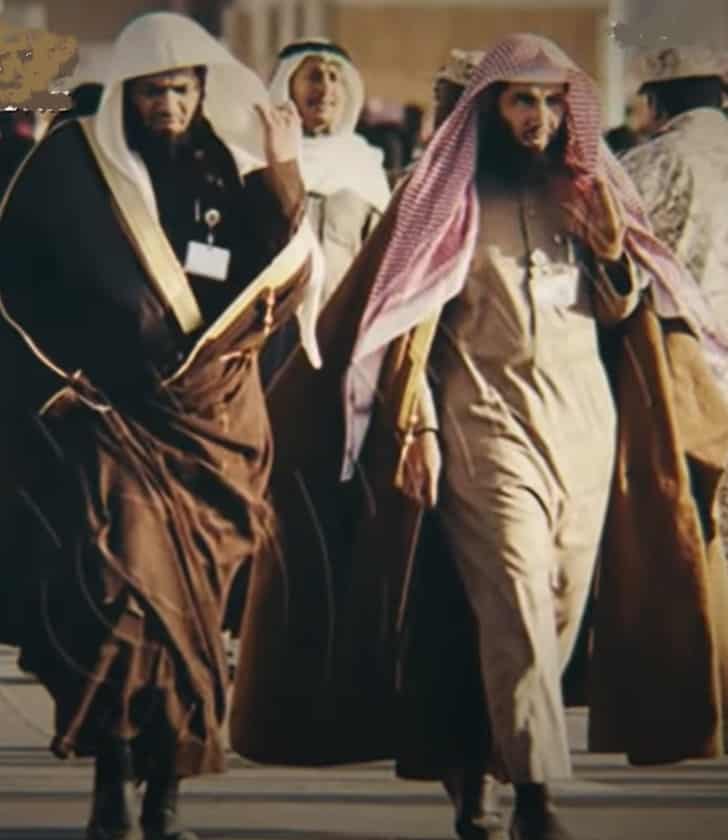
For forty years they were the enforcers of strict government rules regarding:
- How women dress
- The separation of the sexes
- Closing of shops, restaurants in prayer times
- Forcing Muslims into the mosques to perform the 5 daily prayers
- Stopping Birthday parties and Valentine’s Day celebrations
- Banning photography in public
- Banning Pokemon and Barbie Dolls
- Banning the sale of dogs and cats
- Prosecuting fortune tellers, faith healers, and magicians
If groups of women sat alone in Mall cafeterias or parks, they would be questioned and moved. Women were often scolded for so-called inappropriate dress.
Violators could be detained, fined, imprisoned even executed depending on the offense. Groups of young men would be questioned and scolded for any inappropriate behavior.
Why Enjoin The Good and Prevent The Bad?-Understanding Hisb
Telling people how to behave properly and jumping in to put them right is nothing new in the Islamic world.
It is an age-old practice and tradition which is still very much alive today in Saudi Arabia and across the Muslim world although it is very much the anathema now in the West and in secular nations.
It is based on the doctrine of Hisb which is the belief that every person or group has a moral obligation to enjoin the good and forbid the bad in the actions and behavior of others in order to maintain behavioral norms that exist under Islamic law sharia.
It has its roots in the following Quranic verse Surat Al Imran Verse 104. According to the Holy Quran, a nation that enjoins good and forbids the bad is the foundation of a successful society,
According to the Holy Quran, a nation that enjoins good and forbids the bad is the foundation of a successful society,
However, understanding when and who should intervene to put other people’s behavior right is forever being debated.
The interpretation and codification of Hisb into the legal system was guided by a Hadith by Prophet Mohammed (SAW) that evil actions should be prevented by the hand, tongue, or heart and later codified in legal interpretations.
If I had a penny for every time a Muslim has quoted this Hadith to me, I would be a rich man today.
Without consciously knowing why, when improper actions occur, Muslims, in general, feel a moral, religious obligation to intervene by either using physical force (hand), speaking against the action (tongue), and if they are unable to speak to hate it (heart).
Who Can Enjoin The Good And Prevent The Bad? -Hisb In Practise
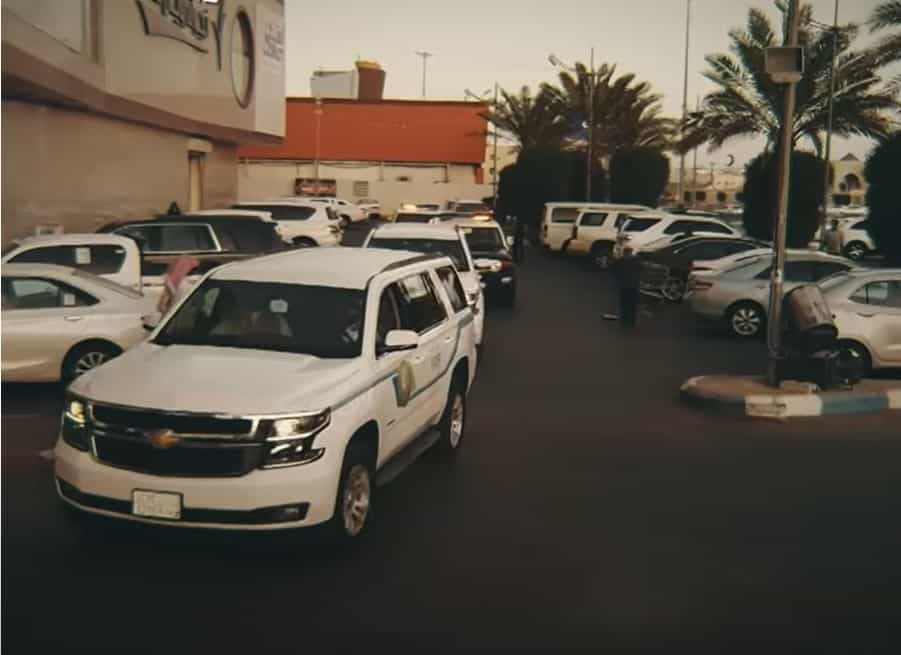
This intervention can be personal in families or between friends, the state with its people, or a local government official traditionally called the Mutasib responsible for behavior in businesses, market places, fraud, public and moral behavior.
When you come to the Arab world from the West, you will feel this difference immediately. People here in the Muslim world are very much involved in the lives of others. Restrictions exist and it feels more like caring. And, it really is.
In the West, people generally do not interfere with the lives of others. It feels freer, but lonelier as if no one cares. And, they really don’t.
Enjoining The Good And Forbidding The Bad -The Early Years
The notion of Hisb  as a Muslim’s duty to put people right began formally in Saudi Arabia nearly 300 years ago with the first (1745–1818) and second Saudi states (1823–1887).
as a Muslim’s duty to put people right began formally in Saudi Arabia nearly 300 years ago with the first (1745–1818) and second Saudi states (1823–1887).
It has a strong association with the Islamic doctrine of Muhammad Ibn Abdul Wahaab and Muhammad Ibn Saud who both made a pact to return the peninsula Arabs back to the original principles and a purer understanding and practice of Islam. (Tawheed
who both made a pact to return the peninsula Arabs back to the original principles and a purer understanding and practice of Islam. (Tawheed ).
).
After the retaking of Riyadh Diriyah of Abu Azizi Ibn Saud (Ibn Saud ) in 1901, the practice of enjoining the good and forbidding the bad continued and 70 years later became formalized in 1975 to become known as the Committee for the Promotion of Virtue and the Prevention of Vice (CPVPV) during the reign of King Khalid As Saud.
) in 1901, the practice of enjoining the good and forbidding the bad continued and 70 years later became formalized in 1975 to become known as the Committee for the Promotion of Virtue and the Prevention of Vice (CPVPV) during the reign of King Khalid As Saud.
The CPVPV Made A Very Positive Contribution
During these 70 years, in the pursuit of Hisb, the CPVPV religious police provided fatherly religious advice and much-needed guidance to Saudi society. Their behavior was tolerant, optimistic, and welcomed by the people.
After its proper establishment in 1940, the CPVPV views were always moderate, apolitical, and balanced.
From 1976, the religious police expanded and in 1980 its administrative operations became formalized by Royal Decree 37 as follows.
- New General Presidency
- Presidency Authority
- Appointment of Staff and Members
- Establishment of Duties In Towns and Cities
The CPVPV Gets A Bad Name
The CPVPV started to get a bad name in the 1980s and 90s due to their hard-lined interpretations of Islam and the rough treatment of individuals who were found to be violating Islamic norms in public.
Amateur Videos Spark Saudi Religious Police Debate On BBC News
Some observers blame the bad behavior  on the existence of extreme ideologies that followed the appearance of the new Sahwa
on the existence of extreme ideologies that followed the appearance of the new Sahwa (Islamic awakening) ideological movement in the Kingdom that had started here in the 1940 and 50s which took its full expression in the 1990s and 2000s.
(Islamic awakening) ideological movement in the Kingdom that had started here in the 1940 and 50s which took its full expression in the 1990s and 2000s.
Sahwa is an Islamic reformist program that puts the true practice of Islam and active political life as its goals. It became very popular and took root.
Proponents of Sahwa principles carried great favor with the Saudi government in the 80s and 90s, since they supported government aims and programs.
However, when the movement started to make demands on the government to share political power, reforms, and to end corruption, the state started to crack down, arrest, and imprison Shawa leaders.
Religious Police Excesses and Abuses
The ruling to severely restrict CPVPV powers by the Saudi Council of Ministers in 2016 came after a number of abuses that ended in tragic deaths many of which were posted on social media platforms showing groups of religious police abusing and harassing people in public places.
The 2002 Mecca Girls’ School Fire
Two CPVPV members were blamed in this incident for preventing school girls from leaving a burning school building in which 15 of them died.
An investigation later cleared them and the cause of death was later found to related to improper overcrowding and poor safety measures.
Click here to read the article Mecca School Girls Fire.
Attack on a British Man With Saudi Wife In 2014
The following video shows an angry CPVPV member jumping on the back of a British national following an altercation in a Womens/Family section of the store from where the British man had refused to leave. His stubbornness resulted in a physical altercation.
Religious Police Patrol Vehicle Chases A Saudi FAther and He Dies in A Crash in Baha in 2002
Members of the CPVPV pursue a Saudi father with his children in a vehicle at high-speed causing him to drive over a bridge and plunge to his death and which resulted in serious injuries the children.
Click here to read the 2012 Arab News Report .
.
Six CPVPV members In Vehicles Chase Two Saudi Men Who Crash And Plunge To Their Deaths In 2013
Religious police chase two young Saudis who crash and die. Four CPVPV members lie about the incident but all six are cleared of the murders. Click here to read the Arab News Article o f the incident.
f the incident.
Religious Police Destroy Musical Lute Instruments in 2010
In 2010, religious zealots publically smash and destroy musical instruments and cassette tapes containing music.
Saudi Women Harassed By Hai’a members In A Mall For Wearing Makeup in 2012
Saudi woman verbally challenges the members of the CPVPV who follow and harass her for wearing nail polish and makeup.
A Member of the Religious Police Lecture And Harass A Syrian Employee Working In A Musical Instrument Shop.
A secret camera shows a CPVPV member discussing the morality of selling musical instruments with a shop employee.
CPVPV Religious Police Become Outlawed
In 2016, their policing activities were sharply reduced by the Saudi Council of Ministers following years of abuses of citizens and cases of accidental and unnecessary deaths. (See above)
Changes in the new regulation were that “heads of centers and members of the [religious police] are not to arrest people, restrain them, chase them, request their documents, confirm their identities, or follow them…” (Article 7.2)
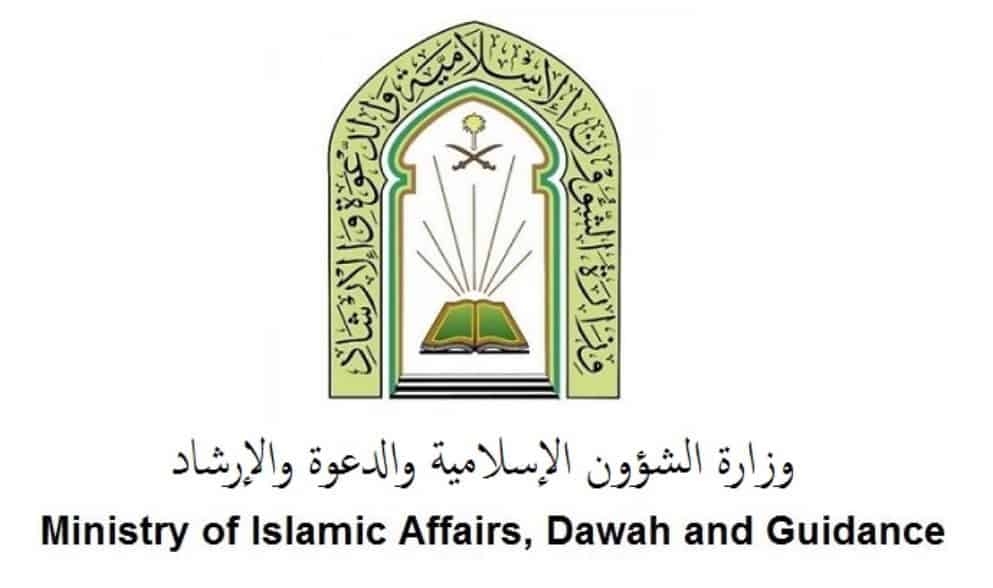
Although the CPVPV is still in operation today, their activities and powers of arrest has been drastically reduced.
They are no longer permitted to stop people, take IDs, arrest or interrogate them in public places as was the case in previous years.
However, they can report instances of crime or immoral behavior to the appropriate authorities such as the police or drug enforcement authorities.
If they do speak to other people in public, it must be done with kindness, respect, and gentleness. They are NO LONGER allowed to question people roughly nor to conduct interrogations.
Have Street Crimes And Immorality Risen In The Absence Of The CPVPV Members
Back in 2016, I was concerned that in the absence of the Hai’a religious police that people would start to misbehave in public and more social problems would occur.
Actually, the opposite appears to have occurred.
Today, even without the threat of religious police, the shops in Malls and markets still do close for the 5 prayer times, but in a more relaxed and respectful fashion.
Shopkeepers and customers gladly follow the regulations but today it is done without the panic and fear that once existed.
Today, I see many more women out and about in and n the whole they behave as respectfully as before.
People still go to pray in the mosques as before, perhaps even more than during the era of the religious police.
I notice that people continue to respect the Saudi/Islamic customs and traditions very well, but it is done without the fear and worry of being called into question for it.
Overall, it is a definite improvement.
However, I do miss seeing the CPVPV members out and about. Their very presence was a reminder of the duties that Muslims ought to fulfill.
Enjoining Muslims to do good and preventing bad is very beneficial for Saudi society and should really continue. However, the old CPVPV members appeared to have spoiled the ideology of Hisbh with their harshness and authoritarian ways.
Traditional Attitudes Remain In Spite Of CPVPV Absence
The religious police are no longer in operation in public areas, but their absence has not greatly altered the behavior of Saudi people and foreign expats.
People still dress and behave as conservatively as before. The exceptions perhaps are young teenagers and the youth. They are more relaxed, louder, and behave more freely and wildly than ever.
For example, you can often see young men driving cars, playing loud music and shouting out of the windows. That is something I never saw before. I noticed that young women are more relaxed in public places now.
There is still a separation of the sexes in shops and restaurants, but there is greater ease and accommodation now.
Saudi Tourist eVisa and New Public Decency Laws 2019
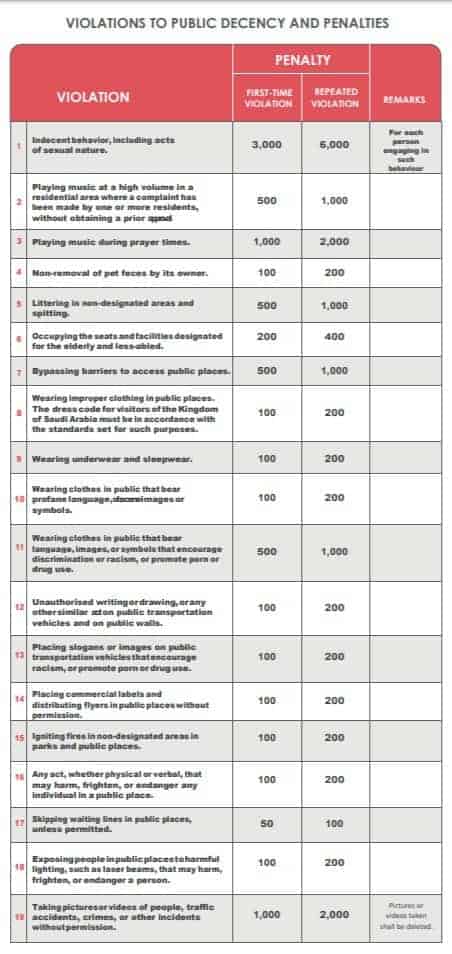
The month of September 2019 marked a huge change of attitude towards foreigners in Saudi Arabia with the introduction of the new Saudi Tourist eVisa.
For the first time in decades, it became possible for anyone from 49 + countries to obtain an instant online Saudi Tourist eVisa in about 15 minutes or even a Visa on Arrival to visit Saudi Arabia for up to 3 months.
in about 15 minutes or even a Visa on Arrival to visit Saudi Arabia for up to 3 months.
To facilitate this, the once strict laws regarding dress and behavior have now relaxed. For example, women no longer need to put on the long black abaya garment in public as was the case in the past.
Also, unmarried non-Muslim couples are now permitted to stay together in hotels and tourist residences.
Ironically though and possibly in anticipation of the appearance of foreign dress codes new public decency laws were passed and implemented in Jan 2020 that penalize violations of public indecency that apply to citizens, residents, and tourists to the kingdom.
The new legislation is intended to regulate the public behavior of Saudi nationals, expat residents, visitors, and tourists in accordance with the prevailing Saudi customs, values, and culture.
The prohibition targets individuals who wear ‘indecent’ or revealing clothing or garments with pictures, prints, signs or phrases that contravene standards of public decency.
Additionally, it bans acts of graffiti in public places, transport, buses and any instance of verbal intimidating and/or threatening behavior & writing.
To know how to properly dress and to read more about the new public decency laws and fines in the kingdom click on the following link: The Common Sense Guide To How (Non-Saudi) Men Should Dress In Saudi Arabia
The new laws that relate to dress for men, behavior in public, and taking photos and videos. Penalties can reach up to SR 3,000 or $800. (See Offences and Fines List Above)
Related Questions
Which Police Forces Operate In Saudi Arabia?
There are a number of police or security forces in operation.
- Traffic Police (Black Uniforms, Berets and Patrol Cars in 2016)
- Plain Clothed Police (Thobe, Headgear Shamagh and Black GMC Suburban
- National Guard (Black Uniform and HeadGear Shamagh)
- Local Security Forces (Brown Uniforms and Green/Red patrol vehicles)
- Religious Police (Defunct) (Thogbe, Headgear Shamagh and Cloak, Bisht)
- Haram Mosque Police (Red and Orange Uniforms)
What Are The Numbers For Emergency Services in Saudi Arabia?
| Emergency Services Numbers For Saudi Arabia | |
| Emergencies | 112 |
| Ambulance Service | 997 |
| Fire Service | 998 |
| Police | 999 |
| Traffic Accidents (Emergencies) | 993 |
| Najm (Car Accident Evaluators) | 9200 00560 |
References And Useful Resources
- Religious police arrested after pushing woman shopper
 -The Daily Mail
-The Daily Mail - Enjoying The Right and Forbidding The Wrong
 -Wikipedia
-Wikipedia - Committee for the Promotion of Virtue and Prevention of Vice-
 Wikipedia
Wikipedia - King Khalid As Saud
 – Wikipedia
– Wikipedia - Why did the Saudi Virtue Promotion Authority collapse?
 – YouTube
– YouTube - Hisbh Doctrine
 -Wikipedia
-Wikipedia - Hadith Nawawi Whosoever sees an evil
 -Sunnah.com
-Sunnah.com - Muhammed Ibn Abdul Wahab and the First and Second Saudi State
 -Wikipedia
-Wikipedia - Tawheed
 – Wikipedia
– Wikipedia - Valentines Day Returns To Saudi Arabia
 – Arab News
– Arab News - What is Sahwa, the Awakening movement under pressure in Saudi
 -Al Jazeera
-Al Jazeera - The One-Step Guide To The Saudi Tourist eVisa– insidesaudi.com
- The Common Sense Guide To How (Non-Saudi) Men Should Dress In Saudi Arabia
 – Insidesaudi.com
– Insidesaudi.com
